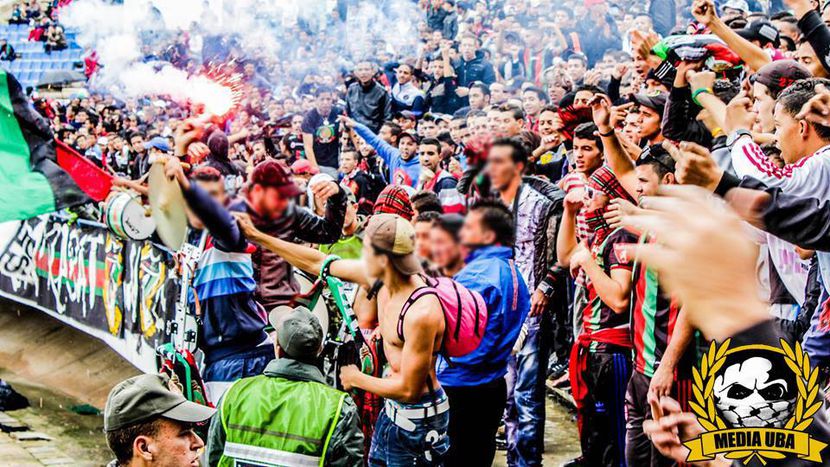
Ultras in Morocco: "They consider us animals“
Published on
Translation by:
 Danny S.
Danny S.
In Casablanca this year, bloody fights are being carried out between rivaling hooligans. Violence is even directed toward one's own players after athletic failures. Visit a world in which football is increasingly becoming something to be taken radically serious.
Said, Hicham and Ismail* don't know each other, but it might be possible that they've already beaten each other up. "We would lay down our lives for the club," says Said with a callous expression as he shrouds himself in a cloud of hashish smoke. He doesn't laugh much, and what comes across as a hackneyed phrase sounds alarmingly believable coming from his mouth. Said is a member of the Ultra Black Army, which is supported by FAR Rabat. Hicham is a part of the 'Winners', the Ultras Wydad Casablancas, while Ismail, his rival, is one of the 'Green Boys' of the local Raja Club Athletic. Their clubs are the most successful in Morocco, their hostility the most embittered.
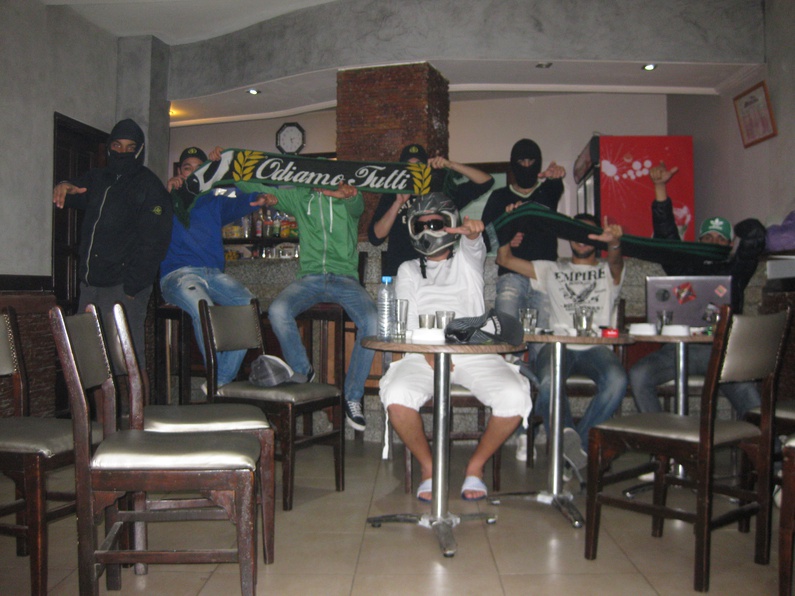 The arabesques on the wall paneling are obscured; too little light reaches the backmost corner of the café in Rabat, Morocco's capital. "They consider us animals," says Said before taking another deep drag. He's sitting with four other Black Army members at the table — mid-twenties and strongly build, track suits and heavy silver bracelets. They're sceptical about journalists. They say that the press has too often reported false information about them, their image in society is too negative.
The arabesques on the wall paneling are obscured; too little light reaches the backmost corner of the café in Rabat, Morocco's capital. "They consider us animals," says Said before taking another deep drag. He's sitting with four other Black Army members at the table — mid-twenties and strongly build, track suits and heavy silver bracelets. They're sceptical about journalists. They say that the press has too often reported false information about them, their image in society is too negative.
150 with knives and clubs
In recent years, Moroccan Ultras have often stirred up a sensation through violence. Tragic notoriety elicited the term 'Black Thursday': before the confrontation between Raja Casablanca and FAR Rabat in April 2013, hundreds of Ultras and other hooligans left behind a trail of desolation in Casablanca. One year before that, the 21-year-old Hamza Bakkali, a member of the 'Winners', died as a result of riots. And just in March of this year, 150 'Winners', who were armed with knives and clubs, stormed the training grounds of their own football team, threatening the players and their coach in response to alleged corruption and a series of athletic failures. Afterwards they marauded the locker rooms, looking for anything that might be of value.
Hicham was there and grins mischievously when he tells the story from that day. The 19-year-old is standing on a flat roof full of clotheslines in Casablanca. From here an ocean of satellite dishes makes itself apparent. On a distant wall a piece of 'Winners' graffiti, chipping in big chunks, is recognizable. For Hicham the action was justified: "Afterwards they finally won!" According to him, it was a benefit to the well-being of the club.
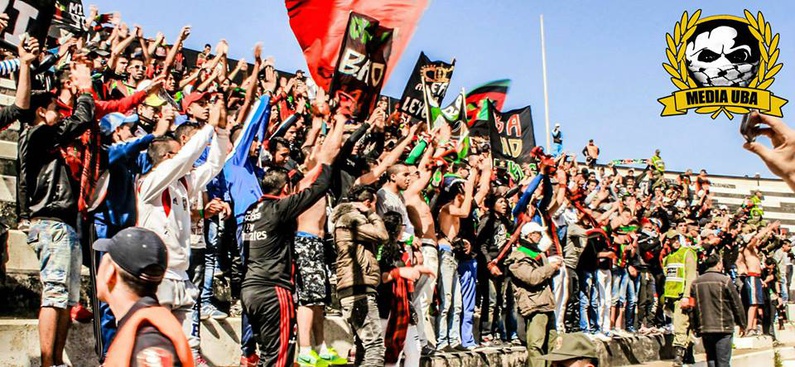 Maybe Ismail would endorse him. He tilts his head and squints his eyes, ducks under his cigarette smoke and affirms that supporting the club takes precedence over everything else. He's large, haggard and already 38 years old. Nine younger Green Boys are sitting next to him in the sparsely decorated café with its white-tiled floors, not far from Hichams roof. Proud, they show Youtube videos of choreography in the stands, of chanting and banners — this is what it's all about, they say, violence isn't an end within itself. They see Black Thursday as a minority's big, foolish mistake. They don't want to be perceived as hooligans. They want to elicit respect from other Ultras; but if they don't receive this respect, then violence is occasionally unavoidable.
Maybe Ismail would endorse him. He tilts his head and squints his eyes, ducks under his cigarette smoke and affirms that supporting the club takes precedence over everything else. He's large, haggard and already 38 years old. Nine younger Green Boys are sitting next to him in the sparsely decorated café with its white-tiled floors, not far from Hichams roof. Proud, they show Youtube videos of choreography in the stands, of chanting and banners — this is what it's all about, they say, violence isn't an end within itself. They see Black Thursday as a minority's big, foolish mistake. They don't want to be perceived as hooligans. They want to elicit respect from other Ultras; but if they don't receive this respect, then violence is occasionally unavoidable.
The Bonbons Sauvages: rage instead of pain
Violence isn't a part of every Ultra member's mantra — whether or not as an end within itself. Some have scars on their faces and can't even count how many wounds they've had; after all, they don't talk about their brawls. Karim, a bulky member of the Black Army, just barely escaped death after a football game in 2005 where he, having been beaten and kicked, felt multiple knives rammed into his back while lying on the ground.
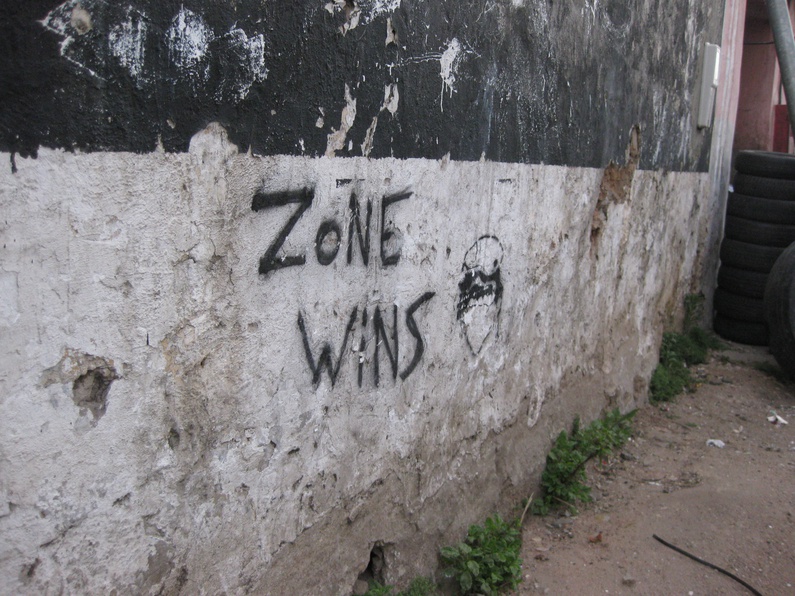 'Bonbon sauvages' is what Hicham calls the pills that he often takes before going to the stadium: benzodiazepine — a drug that replaces pain with wild rage. Even he affirms that the Club is the focal point of his life. However, he likes hearing himself when he says things such as "we show no mercy on the battlefield," or when he tells the story about one of the Green Boys who allegedly cut off the chin of one of the Winners, who then fled to Senegal out of fear of death, or when he assures the unscrupulousness with which he would murder one of the Ultras that comes from the capital but who in the meantime lives in his neighborhood. His martial affirmations don't seem to fit his youthful appearance. However, the casualness with which he explains all this, which he shakes off the next moment by shrugging his shoulders and smiling, leaves behind a queasy feeling.
'Bonbon sauvages' is what Hicham calls the pills that he often takes before going to the stadium: benzodiazepine — a drug that replaces pain with wild rage. Even he affirms that the Club is the focal point of his life. However, he likes hearing himself when he says things such as "we show no mercy on the battlefield," or when he tells the story about one of the Green Boys who allegedly cut off the chin of one of the Winners, who then fled to Senegal out of fear of death, or when he assures the unscrupulousness with which he would murder one of the Ultras that comes from the capital but who in the meantime lives in his neighborhood. His martial affirmations don't seem to fit his youthful appearance. However, the casualness with which he explains all this, which he shakes off the next moment by shrugging his shoulders and smiling, leaves behind a queasy feeling.
Despotism and brutality
Despite the violence in their immediate environments, the Ultras feel are unjustifiably vilified as a safety threat, especially since the law was passed in January 2011 that forbade violence in stadiums. That restricts their freedom of assembly — there are a list of special permits that they need for their actions and events — and simplifies the gathering of their personal data. Above all, it makes it easier for police to arrest Ultra members. Hicham, Said and Ismail all reproach the police with the same thing: despotism and brutality. People are randomly beaten and imprisoned for weeks.
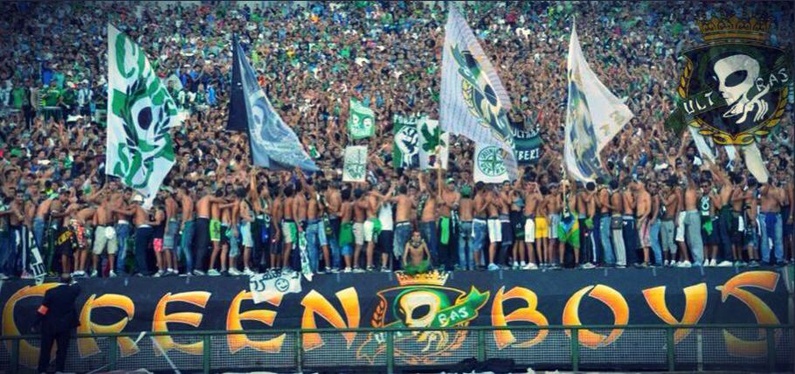 Even though they like the role of rebels, one can't attribute a political dimension to the various groups. Questions regarding the political protests in Spring of 2011 sparks nothing but indifference. "The the government has nothing to do with me," says Hicham. Although they bemoan the discrimination against them being Ultras, many are satisfied with the general political situation in Morocco. Ultras aren't a lower class phenomenon; they come from nearly all parts of society. Said is unemployed, Hicham is finishing his schooling via the internet and Ismail is a location scout for a film company. Many others either study or have secure jobs.
Even though they like the role of rebels, one can't attribute a political dimension to the various groups. Questions regarding the political protests in Spring of 2011 sparks nothing but indifference. "The the government has nothing to do with me," says Hicham. Although they bemoan the discrimination against them being Ultras, many are satisfied with the general political situation in Morocco. Ultras aren't a lower class phenomenon; they come from nearly all parts of society. Said is unemployed, Hicham is finishing his schooling via the internet and Ismail is a location scout for a film company. Many others either study or have secure jobs.
Despite how different they may be and how much they'd like to hate each other, they are unanimously proud of their lives as Ultras. They've found their niche between the stadiums and brawls; they can express and define themselves outside of established social conventions. Some may be willing to die for their club, but they all live for their niche. "We're full-time Ultras," says Said. And for the first time all evening, a smile sweeps across the dim shadow on his face.
*All names have been changed.
This article was written in the context of the project "Euromed reporter" casablanca in partnership with café babel and the Anna lindh foundation. Soon you will find all articles of the euromed reporter on page one of ouR magazine.
Translated from Ultras in Marokko: „Sie halten uns für Tiere“




